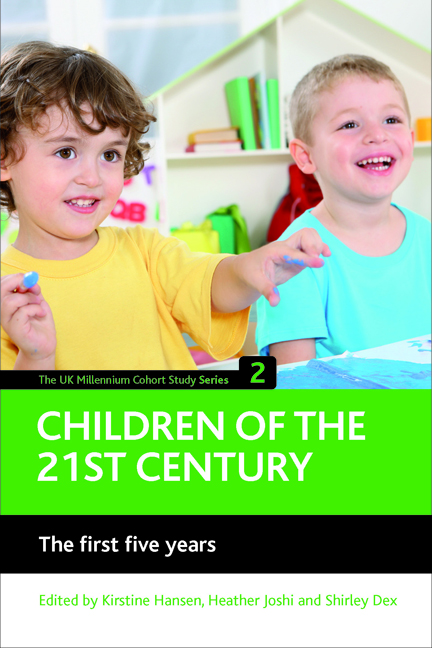Book contents
- Frontmatter
- Contents
- Acknowledgements
- List of contributors
- Glossary
- one Introduction
- two Child poverty in the first five years of life
- three Ethnicity, community and social capital
- four Parental relationships and parenting
- five Partnership trajectories, parent and child well-being
- six Employment trajectories and ethnic diversity
- seven Neighbourhoods and residential mobility
- eight Childcare in the pre-school years
- nine Intergenerational inequality in Early Years assessments
- ten Ethnic inequalities in child outcomes
- eleven School choice
- twelve Teacher assessments in the first year of school
- thirteen Childhood overweight and obesity
- fourteen Resilience in children's development
- fifteen Parental and child health
- sixteen Conclusions
- References
eight - Childcare in the pre-school years
Published online by Cambridge University Press: 01 September 2022
- Frontmatter
- Contents
- Acknowledgements
- List of contributors
- Glossary
- one Introduction
- two Child poverty in the first five years of life
- three Ethnicity, community and social capital
- four Parental relationships and parenting
- five Partnership trajectories, parent and child well-being
- six Employment trajectories and ethnic diversity
- seven Neighbourhoods and residential mobility
- eight Childcare in the pre-school years
- nine Intergenerational inequality in Early Years assessments
- ten Ethnic inequalities in child outcomes
- eleven School choice
- twelve Teacher assessments in the first year of school
- thirteen Childhood overweight and obesity
- fourteen Resilience in children's development
- fifteen Parental and child health
- sixteen Conclusions
- References
Summary
Introduction
For the children born around the turn of the millennium pre-school care and education became a near universal experience. This reflects the spread of education to younger children and the increasing ‘normality’ of mothers taking paid work outside the home. This chapter is concerned with the Millennium Cohort Study (MCS) children's experience of care from people other than the mother, with an emphasis on those children who attended group childcare settings at some point during their pre-school years. It begins by outlining the evolving experience of non-maternal care for all the children in the MCS, across the UK, from infancy to primary school. It goes on to put a microscope on 301 childcare settings attended by a sub-group of children in England in 2005, providing a detailed picture of the services that children received in an unprecedented era of public and private provision. We compare the families who did, and did not, use centre-based care, then describe the quality of centre-based care experienced by the children who did attend, and explore differential access to high-quality services. We also describe the characteristics of centres that were providing high-quality care because they may provide guidance for good practice. Finally, we discuss the results in terms of government policy, ending with recommendations that could improve the quality of childcare provision.
Four questions are addressed in this chapter:
1) What are the childcare experiences of children in the MCS?
2) Is social class related to patterns of childcare use?
3) What is the quality of the group childcare experienced by the MCS, and does it vary according to family and child characteristics?
4) Which characteristics of childcare centres are related to high-quality provision?
What is childcare?
The term ‘childcare’ has various, overlapping, definitions. It refers to services that provide custody and nurture to children whose parents are not present, for a variety of reasons, and a variety of timespans. The parents may be unable to take direct care of their children, because a mother is working outside the home, because the parents are incapable of looking after their children or because they choose to delegate at least some of the care to others, particularly specialists.
- Type
- Chapter
- Information
- Children of the 21st century (Volume 2)The First Five Years, pp. 131 - 152Publisher: Bristol University PressPrint publication year: 2010



